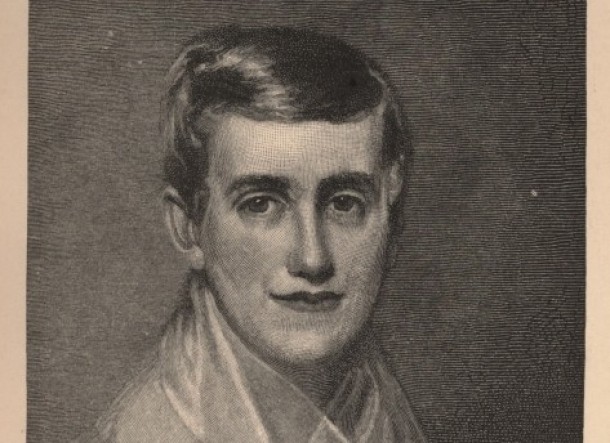
Prudence Crandall
Prudence Crandall (1803-1890)
In 1995 the General Assembly designated abolitionist and teacher Prudence Crandall our State Heroine. Rhode Island-born Crandall opened the Canterbury Female Seminary in 1831. In 1832, she admitted an African American student, Sarah Harris. Many parents removed their children as a result. Crandall stood firm, re-opening the school as an academy for young black women, the first in New England. Harassment followed: a new state “Black Law” that imposed barriers to equal education, three court trials, and mob attacks that forced the school’s closure in 1834. Crandall left the state but remained committed to social reform. Today, the Prudence Crandall Museum is a site on the Connecticut Women’s Heritage Trail as well as the Connecticut Freedom Trail.
Featured
A headmistress champions education for African American women and although forced to close her school in 1834, she helped win the battle for generations that followed. …[more]
Learn More
58529
XSRXJV4B
1
apsa
50
default
48857
http://connecticuthistory.org/wp-content/plugins/zotpress/
%7B%22status%22%3A%22success%22%2C%22updateneeded%22%3Afalse%2C%22instance%22%3Afalse%2C%22meta%22%3A%7B%22request_last%22%3A0%2C%22request_next%22%3A0%2C%22used_cache%22%3Atrue%7D%2C%22data%22%3A%5B%7B%22key%22%3A%22KETNZ6TS%22%2C%22library%22%3A%7B%22id%22%3A58529%7D%2C%22meta%22%3A%7B%22lastModifiedByUser%22%3A%7B%22id%22%3A14399323%2C%22username%22%3A%22kquotap%22%2C%22name%22%3A%22%22%2C%22links%22%3A%7B%22alternate%22%3A%7B%22href%22%3A%22https%3A%5C%2F%5C%2Fwww.zotero.org%5C%2Fkquotap%22%2C%22type%22%3A%22text%5C%2Fhtml%22%7D%7D%7D%2C%22creatorSummary%22%3A%22DiMartino%22%2C%22parsedDate%22%3A%222024%22%2C%22numChildren%22%3A0%7D%2C%22bib%22%3A%22%3Cdiv%20class%3D%5C%22csl-bib-body%5C%22%20style%3D%5C%22line-height%3A%201.35%3B%20padding-left%3A%201em%3B%20text-indent%3A-1em%3B%5C%22%3E%5Cn%20%20%3Cdiv%20class%3D%5C%22csl-entry%5C%22%3EDiMartino%2C%20Joanie.%202024.%20%26%23x201C%3BThe%20Canterbury%20Female%20Boarding%20School%20Story%20in%20the%2021st%20Century.%26%23x201D%3B%20%3Ci%3EConnecticut%20Explored%3C%5C%2Fi%3E.%20%3Ca%20class%3D%27zp-ItemURL%27%20href%3D%27https%3A%5C%2F%5C%2Fwww.ctexplored.org%5C%2Fcanterbury-female-boarding-school%5C%2F%27%3Ehttps%3A%5C%2F%5C%2Fwww.ctexplored.org%5C%2Fcanterbury-female-boarding-school%5C%2F%3C%5C%2Fa%3E.%3C%5C%2Fdiv%3E%5Cn%3C%5C%2Fdiv%3E%22%2C%22data%22%3A%7B%22itemType%22%3A%22magazineArticle%22%2C%22title%22%3A%22The%20Canterbury%20Female%20Boarding%20School%20Story%20in%20the%2021st%20Century%22%2C%22creators%22%3A%5B%7B%22creatorType%22%3A%22author%22%2C%22firstName%22%3A%22Joanie%22%2C%22lastName%22%3A%22DiMartino%22%7D%5D%2C%22abstractNote%22%3A%22%22%2C%22date%22%3A%22Spring%202024%22%2C%22language%22%3A%22%22%2C%22ISSN%22%3A%22%22%2C%22url%22%3A%22https%3A%5C%2F%5C%2Fwww.ctexplored.org%5C%2Fcanterbury-female-boarding-school%5C%2F%22%2C%22collections%22%3A%5B%22XSRXJV4B%22%2C%22JBUNXIM3%22%5D%2C%22dateModified%22%3A%222024-07-10T15%3A01%3A38Z%22%7D%7D%2C%7B%22key%22%3A%22AXIG77C2%22%2C%22library%22%3A%7B%22id%22%3A58529%7D%2C%22meta%22%3A%7B%22lastModifiedByUser%22%3A%7B%22id%22%3A14399323%2C%22username%22%3A%22kquotap%22%2C%22name%22%3A%22%22%2C%22links%22%3A%7B%22alternate%22%3A%7B%22href%22%3A%22https%3A%5C%2F%5C%2Fwww.zotero.org%5C%2Fkquotap%22%2C%22type%22%3A%22text%5C%2Fhtml%22%7D%7D%7D%2C%22numChildren%22%3A0%7D%2C%22bib%22%3A%22%3Cdiv%20class%3D%5C%22csl-bib-body%5C%22%20style%3D%5C%22line-height%3A%201.35%3B%20padding-left%3A%201em%3B%20text-indent%3A-1em%3B%5C%22%3E%5Cn%20%20%3Cdiv%20class%3D%5C%22csl-entry%5C%22%3E%26%23x201C%3BThe%20Unionist%20Unified.%26%23x201D%3B%20%3Ca%20class%3D%27zp-ItemURL%27%20href%3D%27https%3A%5C%2F%5C%2Fsjsu-library.github.io%5C%2Funionist%5C%2F%27%3Ehttps%3A%5C%2F%5C%2Fsjsu-library.github.io%5C%2Funionist%5C%2F%3C%5C%2Fa%3E.%3C%5C%2Fdiv%3E%5Cn%3C%5C%2Fdiv%3E%22%2C%22data%22%3A%7B%22itemType%22%3A%22webpage%22%2C%22title%22%3A%22The%20Unionist%20Unified%22%2C%22creators%22%3A%5B%5D%2C%22abstractNote%22%3A%22%22%2C%22date%22%3A%22%22%2C%22url%22%3A%22https%3A%5C%2F%5C%2Fsjsu-library.github.io%5C%2Funionist%5C%2F%22%2C%22language%22%3A%22%22%2C%22collections%22%3A%5B%22XSRXJV4B%22%2C%22WTH3GFKG%22%5D%2C%22dateModified%22%3A%222024-07-10T14%3A54%3A14Z%22%7D%7D%2C%7B%22key%22%3A%22Z3CBN3AX%22%2C%22library%22%3A%7B%22id%22%3A58529%7D%2C%22meta%22%3A%7B%22lastModifiedByUser%22%3A%7B%22id%22%3A14399323%2C%22username%22%3A%22kquotap%22%2C%22name%22%3A%22%22%2C%22links%22%3A%7B%22alternate%22%3A%7B%22href%22%3A%22https%3A%5C%2F%5C%2Fwww.zotero.org%5C%2Fkquotap%22%2C%22type%22%3A%22text%5C%2Fhtml%22%7D%7D%7D%2C%22creatorSummary%22%3A%22Michals%22%2C%22parsedDate%22%3A%222015%22%2C%22numChildren%22%3A1%7D%2C%22bib%22%3A%22%3Cdiv%20class%3D%5C%22csl-bib-body%5C%22%20style%3D%5C%22line-height%3A%201.35%3B%20padding-left%3A%201em%3B%20text-indent%3A-1em%3B%5C%22%3E%5Cn%20%20%3Cdiv%20class%3D%5C%22csl-entry%5C%22%3EMichals%2C%20Debra.%202015.%20%26%23x201C%3BPrudence%20Crandall%20%281803-1890%29.%26%23x201D%3B%20%3Ci%3ENational%20Women%26%23x2019%3Bs%20History%20Museum%3C%5C%2Fi%3E.%20%3Ca%20class%3D%27zp-ItemURL%27%20href%3D%27https%3A%5C%2F%5C%2Fwww.womenshistory.org%5C%2Feducation-resources%5C%2Fbiographies%5C%2Fprudence-crandall%27%3Ehttps%3A%5C%2F%5C%2Fwww.womenshistory.org%5C%2Feducation-resources%5C%2Fbiographies%5C%2Fprudence-crandall%3C%5C%2Fa%3E.%3C%5C%2Fdiv%3E%5Cn%3C%5C%2Fdiv%3E%22%2C%22data%22%3A%7B%22itemType%22%3A%22webpage%22%2C%22title%22%3A%22Prudence%20Crandall%20%281803-1890%29%22%2C%22creators%22%3A%5B%7B%22creatorType%22%3A%22author%22%2C%22firstName%22%3A%22Debra%22%2C%22lastName%22%3A%22Michals%22%7D%5D%2C%22abstractNote%22%3A%22%22%2C%22date%22%3A%222015%22%2C%22url%22%3A%22https%3A%5C%2F%5C%2Fwww.womenshistory.org%5C%2Feducation-resources%5C%2Fbiographies%5C%2Fprudence-crandall%22%2C%22language%22%3A%22%22%2C%22collections%22%3A%5B%22XSRXJV4B%22%2C%22I49HESEQ%22%5D%2C%22dateModified%22%3A%222024-07-10T14%3A40%3A56Z%22%7D%7D%2C%7B%22key%22%3A%229ESRZU9H%22%2C%22library%22%3A%7B%22id%22%3A58529%7D%2C%22meta%22%3A%7B%22lastModifiedByUser%22%3A%7B%22id%22%3A14399323%2C%22username%22%3A%22kquotap%22%2C%22name%22%3A%22%22%2C%22links%22%3A%7B%22alternate%22%3A%7B%22href%22%3A%22https%3A%5C%2F%5C%2Fwww.zotero.org%5C%2Fkquotap%22%2C%22type%22%3A%22text%5C%2Fhtml%22%7D%7D%7D%2C%22numChildren%22%3A0%7D%2C%22bib%22%3A%22%3Cdiv%20class%3D%5C%22csl-bib-body%5C%22%20style%3D%5C%22line-height%3A%201.35%3B%20padding-left%3A%201em%3B%20text-indent%3A-1em%3B%5C%22%3E%5Cn%20%20%3Cdiv%20class%3D%5C%22csl-entry%5C%22%3E%26%23x201C%3BThe%20Black%20Law%20of%20Connecticut%20%281833%29%20-%20Citizens%20ALL%3A%20African%20Americans%20in%20Connecticut%201700-1850.%26%23x201D%3B%20%3Ci%3EYale%20University%2C%20The%20Gilder%20Lehrman%20Center%20for%20the%20Study%20of%20Slavery%2C%20Resistance%2C%20%26amp%3B%20Abolition%3C%5C%2Fi%3E.%20%3Ca%20class%3D%27zp-ItemURL%27%20href%3D%27http%3A%5C%2F%5C%2Fglc.yale.edu%5C%2Fsites%5C%2Fdefault%5C%2Ffiles%5C%2Ffiles%5C%2FThe%2520Black%2520Law%2520of%2520Connecticut%25281%2529.pdf%27%3Ehttp%3A%5C%2F%5C%2Fglc.yale.edu%5C%2Fsites%5C%2Fdefault%5C%2Ffiles%5C%2Ffiles%5C%2FThe%2520Black%2520Law%2520of%2520Connecticut%25281%2529.pdf%3C%5C%2Fa%3E.%3C%5C%2Fdiv%3E%5Cn%3C%5C%2Fdiv%3E%22%2C%22data%22%3A%7B%22itemType%22%3A%22webpage%22%2C%22title%22%3A%22The%20Black%20Law%20of%20Connecticut%20%281833%29%20-%20Citizens%20ALL%3A%20African%20Americans%20in%20Connecticut%201700-1850%22%2C%22creators%22%3A%5B%5D%2C%22abstractNote%22%3A%22%22%2C%22date%22%3A%22%22%2C%22url%22%3A%22http%3A%5C%2F%5C%2Fglc.yale.edu%5C%2Fsites%5C%2Fdefault%5C%2Ffiles%5C%2Ffiles%5C%2FThe%2520Black%2520Law%2520of%2520Connecticut%25281%2529.pdf%22%2C%22language%22%3A%22%22%2C%22collections%22%3A%5B%22XSRXJV4B%22%2C%228W9INS82%22%2C%22EPTJI5QG%22%2C%22CRVJJDDQ%22%2C%224S9KGIDM%22%2C%22MPFZABFE%22%2C%22RNQEKFZ5%22%2C%2297PJ2GQS%22%2C%22TMXM39G6%22%2C%22VZ9ZB4NF%22%2C%22DTI2HE3J%22%2C%22Q7VCV2X4%22%2C%222IBIPPQ4%22%5D%2C%22dateModified%22%3A%222024-07-10T14%3A39%3A59Z%22%7D%7D%2C%7B%22key%22%3A%22SST4SXRH%22%2C%22library%22%3A%7B%22id%22%3A58529%7D%2C%22meta%22%3A%7B%22lastModifiedByUser%22%3A%7B%22id%22%3A14399323%2C%22username%22%3A%22kquotap%22%2C%22name%22%3A%22%22%2C%22links%22%3A%7B%22alternate%22%3A%7B%22href%22%3A%22https%3A%5C%2F%5C%2Fwww.zotero.org%5C%2Fkquotap%22%2C%22type%22%3A%22text%5C%2Fhtml%22%7D%7D%7D%2C%22numChildren%22%3A0%7D%2C%22bib%22%3A%22%3Cdiv%20class%3D%5C%22csl-bib-body%5C%22%20style%3D%5C%22line-height%3A%201.35%3B%20padding-left%3A%201em%3B%20text-indent%3A-1em%3B%5C%22%3E%5Cn%20%20%3Cdiv%20class%3D%5C%22csl-entry%5C%22%3E%26%23x201C%3BFinding%20Aid%20to%20the%20Prudence%20Crandall%20Collection.%26%23x201D%3B%20%3Ci%3EConnecticut%20College%20-%20Linda%20Lear%20Center%20for%20Special%20Collections%20%26amp%3B%20Archives%3C%5C%2Fi%3E.%20%3Ca%20class%3D%27zp-ItemURL%27%20href%3D%27http%3A%5C%2F%5C%2Farchivesspace.conncoll.edu%3A8081%5C%2Frepositories%5C%2F2%5C%2Fresources%5C%2F45%27%3Ehttp%3A%5C%2F%5C%2Farchivesspace.conncoll.edu%3A8081%5C%2Frepositories%5C%2F2%5C%2Fresources%5C%2F45%3C%5C%2Fa%3E%20%28June%2028%2C%202012%29.%3C%5C%2Fdiv%3E%5Cn%3C%5C%2Fdiv%3E%22%2C%22data%22%3A%7B%22itemType%22%3A%22webpage%22%2C%22title%22%3A%22Finding%20Aid%20to%20the%20Prudence%20Crandall%20Collection%22%2C%22creators%22%3A%5B%5D%2C%22abstractNote%22%3A%22%22%2C%22date%22%3A%22%22%2C%22url%22%3A%22http%3A%5C%2F%5C%2Farchivesspace.conncoll.edu%3A8081%5C%2Frepositories%5C%2F2%5C%2Fresources%5C%2F45%22%2C%22language%22%3A%22%22%2C%22collections%22%3A%5B%22XSRXJV4B%22%2C%228W9INS82%22%2C%22PI58JD9H%22%2C%223FC5UH7D%22%2C%22E7KRNP8E%22%5D%2C%22dateModified%22%3A%222024-07-10T14%3A39%3A40Z%22%7D%7D%2C%7B%22key%22%3A%227DETTGTS%22%2C%22library%22%3A%7B%22id%22%3A58529%7D%2C%22meta%22%3A%7B%22lastModifiedByUser%22%3A%7B%22id%22%3A14399323%2C%22username%22%3A%22kquotap%22%2C%22name%22%3A%22%22%2C%22links%22%3A%7B%22alternate%22%3A%7B%22href%22%3A%22https%3A%5C%2F%5C%2Fwww.zotero.org%5C%2Fkquotap%22%2C%22type%22%3A%22text%5C%2Fhtml%22%7D%7D%7D%2C%22creatorSummary%22%3A%22Judson%22%2C%22parsedDate%22%3A%221833%22%2C%22numChildren%22%3A0%7D%2C%22bib%22%3A%22%3Cdiv%20class%3D%5C%22csl-bib-body%5C%22%20style%3D%5C%22line-height%3A%201.35%3B%20padding-left%3A%201em%3B%20text-indent%3A-1em%3B%5C%22%3E%5Cn%20%20%3Cdiv%20class%3D%5C%22csl-entry%5C%22%3EJudson%2C%20Andrew.%201833.%20%26%23x201C%3BBroadside%3A%20Barbarism%3A%20Who%20Are%20Now%20the%20Savages%3F%20The%20Indians%2C%20the%20Georgians%2C%20or%20the%20Persecutors%20of%20the%20Noble%20Mind-Ed%20Miss%20Prudence%20Crandall%2C%20of%20Canterbury%2C%20and%20Her%20Excellent%20Pupil%20Miss%20Eliza%20Ann%20Hammond%20of%20Providence%3F%20Will%20Andrew%20T.%20Judson%2C%20for%20Himself%20and%20His%20Canter.%26%23x201D%3B%20%3Ca%20class%3D%27zp-ItemURL%27%20href%3D%27http%3A%5C%2F%5C%2Fhdl.handle.net%5C%2F11134%5C%2F40002%3A20075%27%3Ehttp%3A%5C%2F%5C%2Fhdl.handle.net%5C%2F11134%5C%2F40002%3A20075%3C%5C%2Fa%3E.%3C%5C%2Fdiv%3E%5Cn%3C%5C%2Fdiv%3E%22%2C%22data%22%3A%7B%22itemType%22%3A%22document%22%2C%22title%22%3A%22Broadside%3A%20Barbarism%3A%20Who%20Are%20Now%20the%20Savages%3F%20The%20Indians%2C%20the%20Georgians%2C%20or%20the%20persecutors%20of%20the%20noble%20mind-ed%20Miss%20Prudence%20Crandall%2C%20of%20Canterbury%2C%20and%20her%20excellent%20pupil%20Miss%20Eliza%20Ann%20Hammond%20of%20Providence%3F%20will%20Andrew%20T.%20Judson%2C%20for%20himself%20and%20his%20Canter%22%2C%22creators%22%3A%5B%7B%22creatorType%22%3A%22author%22%2C%22firstName%22%3A%22Andrew%22%2C%22lastName%22%3A%22Judson%22%7D%5D%2C%22abstractNote%22%3A%22Broadside%22%2C%22date%22%3A%221833%22%2C%22language%22%3A%22%22%2C%22url%22%3A%22http%3A%5C%2F%5C%2Fhdl.handle.net%5C%2F11134%5C%2F40002%3A20075%22%2C%22collections%22%3A%5B%22XSRXJV4B%22%2C%228W9INS82%22%2C%22MMT6VCJ4%22%2C%22I3MQ4VRV%22%2C%22TP85WHNN%22%2C%22Q7VCV2X4%22%2C%222IBIPPQ4%22%5D%2C%22dateModified%22%3A%222024-07-10T14%3A39%3A33Z%22%7D%7D%2C%7B%22key%22%3A%22ZZA4XMUQ%22%2C%22library%22%3A%7B%22id%22%3A58529%7D%2C%22meta%22%3A%7B%22lastModifiedByUser%22%3A%7B%22id%22%3A14399323%2C%22username%22%3A%22kquotap%22%2C%22name%22%3A%22%22%2C%22links%22%3A%7B%22alternate%22%3A%7B%22href%22%3A%22https%3A%5C%2F%5C%2Fwww.zotero.org%5C%2Fkquotap%22%2C%22type%22%3A%22text%5C%2Fhtml%22%7D%7D%7D%2C%22numChildren%22%3A0%7D%2C%22bib%22%3A%22%3Cdiv%20class%3D%5C%22csl-bib-body%5C%22%20style%3D%5C%22line-height%3A%201.35%3B%20padding-left%3A%201em%3B%20text-indent%3A-1em%3B%5C%22%3E%5Cn%20%20%3Cdiv%20class%3D%5C%22csl-entry%5C%22%3E%26%23x201C%3BPrudence%20Crandall%20Materials.%26%23x201D%3B%20%3Ci%3EConnecticut%20State%20Library%3C%5C%2Fi%3E.%20%3Ca%20class%3D%27zp-ItemURL%27%20href%3D%27http%3A%5C%2F%5C%2Fctstatelibrary.org%5C%2Fprudencecrandall%27%3Ehttp%3A%5C%2F%5C%2Fctstatelibrary.org%5C%2Fprudencecrandall%3C%5C%2Fa%3E.%3C%5C%2Fdiv%3E%5Cn%3C%5C%2Fdiv%3E%22%2C%22data%22%3A%7B%22itemType%22%3A%22webpage%22%2C%22title%22%3A%22Prudence%20Crandall%20Materials%22%2C%22creators%22%3A%5B%5D%2C%22abstractNote%22%3A%22%22%2C%22date%22%3A%22%22%2C%22url%22%3A%22http%3A%5C%2F%5C%2Fctstatelibrary.org%5C%2Fprudencecrandall%22%2C%22language%22%3A%22%22%2C%22collections%22%3A%5B%22XSRXJV4B%22%2C%228W9INS82%22%2C%22MPFZABFE%22%2C%22VPSI5N5U%22%2C%22E7KRNP8E%22%5D%2C%22dateModified%22%3A%222024-07-10T14%3A36%3A11Z%22%7D%7D%2C%7B%22key%22%3A%22S2AP5N8E%22%2C%22library%22%3A%7B%22id%22%3A58529%7D%2C%22meta%22%3A%7B%22lastModifiedByUser%22%3A%7B%22id%22%3A14399323%2C%22username%22%3A%22kquotap%22%2C%22name%22%3A%22%22%2C%22links%22%3A%7B%22alternate%22%3A%7B%22href%22%3A%22https%3A%5C%2F%5C%2Fwww.zotero.org%5C%2Fkquotap%22%2C%22type%22%3A%22text%5C%2Fhtml%22%7D%7D%7D%2C%22numChildren%22%3A0%7D%2C%22bib%22%3A%22%3Cdiv%20class%3D%5C%22csl-bib-body%5C%22%20style%3D%5C%22line-height%3A%201.35%3B%20padding-left%3A%201em%3B%20text-indent%3A-1em%3B%5C%22%3E%5Cn%20%20%3Cdiv%20class%3D%5C%22csl-entry%5C%22%3E%26%23x201C%3BPrudence%20Crandall%20Museum%2C%20Canterbury.%26%23x201D%3B%20%3Ci%3EState%20of%20Connecticut%3A%20Department%20of%20Economic%20%26amp%3B%20Community%20Development%3C%5C%2Fi%3E.%20%3Ca%20class%3D%27zp-ItemURL%27%20href%3D%27https%3A%5C%2F%5C%2Fportal.ct.gov%5C%2FECD-PrudenceCrandallMuseum%27%3Ehttps%3A%5C%2F%5C%2Fportal.ct.gov%5C%2FECD-PrudenceCrandallMuseum%3C%5C%2Fa%3E.%3C%5C%2Fdiv%3E%5Cn%3C%5C%2Fdiv%3E%22%2C%22data%22%3A%7B%22itemType%22%3A%22webpage%22%2C%22title%22%3A%22Prudence%20Crandall%20Museum%2C%20Canterbury%22%2C%22creators%22%3A%5B%5D%2C%22abstractNote%22%3A%22%22%2C%22date%22%3A%22%22%2C%22url%22%3A%22https%3A%5C%2F%5C%2Fportal.ct.gov%5C%2FECD-PrudenceCrandallMuseum%22%2C%22language%22%3A%22%22%2C%22collections%22%3A%5B%22XSRXJV4B%22%2C%228J747TRG%22%2C%22JW63WGZI%22%2C%22F54UISTW%22%2C%226GD28MDM%22%2C%22MPFZABFE%22%2C%22TNDVM7NZ%22%2C%22TP85WHNN%22%2C%22N35ERJKZ%22%2C%22XN2B8VFA%22%2C%22BG4RZD2W%22%2C%227D3TARZH%22%2C%223RXXGBCJ%22%5D%2C%22dateModified%22%3A%222024-07-10T14%3A34%3A26Z%22%7D%7D%2C%7B%22key%22%3A%226DDKE8AK%22%2C%22library%22%3A%7B%22id%22%3A58529%7D%2C%22meta%22%3A%7B%22lastModifiedByUser%22%3A%7B%22id%22%3A14399323%2C%22username%22%3A%22kquotap%22%2C%22name%22%3A%22%22%2C%22links%22%3A%7B%22alternate%22%3A%7B%22href%22%3A%22https%3A%5C%2F%5C%2Fwww.zotero.org%5C%2Fkquotap%22%2C%22type%22%3A%22text%5C%2Fhtml%22%7D%7D%7D%2C%22parsedDate%22%3A%222017%22%2C%22numChildren%22%3A0%7D%2C%22bib%22%3A%22%3Cdiv%20class%3D%5C%22csl-bib-body%5C%22%20style%3D%5C%22line-height%3A%201.35%3B%20padding-left%3A%201em%3B%20text-indent%3A-1em%3B%5C%22%3E%5Cn%20%20%3Cdiv%20class%3D%5C%22csl-entry%5C%22%3E%26%23x201C%3BPrudence%20Crandall.%26%23x201D%3B%202017.%20%3Ci%3EConnecticut%20Women%26%23x2019%3Bs%20Hall%20of%20Fame%3C%5C%2Fi%3E.%20%3Ca%20class%3D%27zp-ItemURL%27%20href%3D%27http%3A%5C%2F%5C%2Fwww.cwhf.org%5C%2Finductees%5C%2Feducation-preservation%5C%2Fprudence-crandall%5C%2F%27%3Ehttp%3A%5C%2F%5C%2Fwww.cwhf.org%5C%2Finductees%5C%2Feducation-preservation%5C%2Fprudence-crandall%5C%2F%3C%5C%2Fa%3E%20%28March%2024%2C%202012%29.%3C%5C%2Fdiv%3E%5Cn%3C%5C%2Fdiv%3E%22%2C%22data%22%3A%7B%22itemType%22%3A%22webpage%22%2C%22title%22%3A%22Prudence%20Crandall%22%2C%22creators%22%3A%5B%5D%2C%22abstractNote%22%3A%22%22%2C%22date%22%3A%222017%22%2C%22url%22%3A%22http%3A%5C%2F%5C%2Fwww.cwhf.org%5C%2Finductees%5C%2Feducation-preservation%5C%2Fprudence-crandall%5C%2F%22%2C%22language%22%3A%22%22%2C%22collections%22%3A%5B%22XSRXJV4B%22%2C%22I49HESEQ%22%2C%22GRW7C6GM%22%5D%2C%22dateModified%22%3A%222017-03-13T15%3A19%3A16Z%22%7D%7D%2C%7B%22key%22%3A%22U8Q6C4MX%22%2C%22library%22%3A%7B%22id%22%3A58529%7D%2C%22meta%22%3A%7B%22lastModifiedByUser%22%3A%7B%22id%22%3A14399323%2C%22username%22%3A%22kquotap%22%2C%22name%22%3A%22%22%2C%22links%22%3A%7B%22alternate%22%3A%7B%22href%22%3A%22https%3A%5C%2F%5C%2Fwww.zotero.org%5C%2Fkquotap%22%2C%22type%22%3A%22text%5C%2Fhtml%22%7D%7D%7D%2C%22parsedDate%22%3A%222016%22%2C%22numChildren%22%3A0%7D%2C%22bib%22%3A%22%3Cdiv%20class%3D%5C%22csl-bib-body%5C%22%20style%3D%5C%22line-height%3A%201.35%3B%20padding-left%3A%201em%3B%20text-indent%3A-1em%3B%5C%22%3E%5Cn%20%20%3Cdiv%20class%3D%5C%22csl-entry%5C%22%3E%26%23x201C%3BPrudence%20Crandall%20House.%26%23x201D%3B%202016.%20%3Ci%3EConnecticut%20Freedom%20Trail%3C%5C%2Fi%3E.%20%3Ca%20class%3D%27zp-ItemURL%27%20href%3D%27http%3A%5C%2F%5C%2Fwww.ctfreedomtrail.org%5C%2Ftrail%5C%2Fconcept-of-freedom%5C%2Fsites%5C%2F%23%21%5C%2Fprudence-crandall%27%3Ehttp%3A%5C%2F%5C%2Fwww.ctfreedomtrail.org%5C%2Ftrail%5C%2Fconcept-of-freedom%5C%2Fsites%5C%2F%23%21%5C%2Fprudence-crandall%3C%5C%2Fa%3E%20%28July%2023%2C%202012%29.%3C%5C%2Fdiv%3E%5Cn%3C%5C%2Fdiv%3E%22%2C%22data%22%3A%7B%22itemType%22%3A%22webpage%22%2C%22title%22%3A%22Prudence%20Crandall%20House%22%2C%22creators%22%3A%5B%5D%2C%22abstractNote%22%3A%22%22%2C%22date%22%3A%222016%22%2C%22url%22%3A%22http%3A%5C%2F%5C%2Fwww.ctfreedomtrail.org%5C%2Ftrail%5C%2Fconcept-of-freedom%5C%2Fsites%5C%2F%23%21%5C%2Fprudence-crandall%22%2C%22language%22%3A%22%22%2C%22collections%22%3A%5B%22XSRXJV4B%22%2C%228J747TRG%22%2C%22C8N45EN5%22%2C%22Q7VCV2X4%22%2C%22TVAQX9N6%22%5D%2C%22dateModified%22%3A%222016-09-07T21%3A07%3A15Z%22%7D%7D%2C%7B%22key%22%3A%22WG7Q3MB3%22%2C%22library%22%3A%7B%22id%22%3A58529%7D%2C%22meta%22%3A%7B%22lastModifiedByUser%22%3A%7B%22id%22%3A14399323%2C%22username%22%3A%22kquotap%22%2C%22name%22%3A%22%22%2C%22links%22%3A%7B%22alternate%22%3A%7B%22href%22%3A%22https%3A%5C%2F%5C%2Fwww.zotero.org%5C%2Fkquotap%22%2C%22type%22%3A%22text%5C%2Fhtml%22%7D%7D%7D%2C%22parsedDate%22%3A%222010%22%2C%22numChildren%22%3A0%7D%2C%22bib%22%3A%22%3Cdiv%20class%3D%5C%22csl-bib-body%5C%22%20style%3D%5C%22line-height%3A%201.35%3B%20padding-left%3A%201em%3B%20text-indent%3A-1em%3B%5C%22%3E%5Cn%20%20%3Cdiv%20class%3D%5C%22csl-entry%5C%22%3E%26%23x201C%3BA%20Canterbury%20Tale%3A%20A%20Document%20Package%20for%20Connecticut%26%23x2019%3Bs%20Prudence%20Crandall%20Affair.%26%23x201D%3B%202010.%20%3Ci%3EThe%20Gilder%20Lehrman%20Center%20for%20the%20Study%20of%20Slavery%2C%20Resistance%2C%20%26amp%3B%20Abolition%3C%5C%2Fi%3E.%20%3Ca%20class%3D%27zp-ItemURL%27%20href%3D%27http%3A%5C%2F%5C%2Fglc.yale.edu%5C%2Fcanterbury-tale-document-package-connecticuts-prudence-crandall-affair-0%27%3Ehttp%3A%5C%2F%5C%2Fglc.yale.edu%5C%2Fcanterbury-tale-document-package-connecticuts-prudence-crandall-affair-0%3C%5C%2Fa%3E.%3C%5C%2Fdiv%3E%5Cn%3C%5C%2Fdiv%3E%22%2C%22data%22%3A%7B%22itemType%22%3A%22webpage%22%2C%22title%22%3A%22A%20Canterbury%20Tale%3A%20A%20Document%20Package%20for%20Connecticut%27s%20Prudence%20Crandall%20Affair%22%2C%22creators%22%3A%5B%5D%2C%22abstractNote%22%3A%22%22%2C%22date%22%3A%222010%22%2C%22url%22%3A%22http%3A%5C%2F%5C%2Fglc.yale.edu%5C%2Fcanterbury-tale-document-package-connecticuts-prudence-crandall-affair-0%22%2C%22language%22%3A%22%22%2C%22collections%22%3A%5B%22XSRXJV4B%22%2C%22I49HESEQ%22%2C%22UTP4SHQC%22%5D%2C%22dateModified%22%3A%222015-09-08T21%3A04%3A14Z%22%7D%7D%2C%7B%22key%22%3A%2266ZK6KR9%22%2C%22library%22%3A%7B%22id%22%3A58529%7D%2C%22meta%22%3A%7B%22lastModifiedByUser%22%3A%7B%22id%22%3A14399323%2C%22username%22%3A%22kquotap%22%2C%22name%22%3A%22%22%2C%22links%22%3A%7B%22alternate%22%3A%7B%22href%22%3A%22https%3A%5C%2F%5C%2Fwww.zotero.org%5C%2Fkquotap%22%2C%22type%22%3A%22text%5C%2Fhtml%22%7D%7D%7D%2C%22creatorSummary%22%3A%22May%20and%20Judson%22%2C%22parsedDate%22%3A%221833%22%2C%22numChildren%22%3A0%7D%2C%22bib%22%3A%22%3Cdiv%20class%3D%5C%22csl-bib-body%5C%22%20style%3D%5C%22line-height%3A%201.35%3B%20padding-left%3A%201em%3B%20text-indent%3A-1em%3B%5C%22%3E%5Cn%20%20%3Cdiv%20class%3D%5C%22csl-entry%5C%22%3EMay%2C%20Samuel%20J.%2C%20and%20Andrew%20T.%20Judson.%201833.%20%3Ci%3EThe%20Right%20of%20Colored%20People%20to%20Education%2C%20Vindicated%3A%20Letters%20to%20Andrew%20T.%20Judson%2C%20Esq.%20and%20Others%20in%20Canterbury%2C%20Remonstrating%20with%20Them%20on%20Their%20Unjust%20and%20Unjustifiable%20Procedure%20Relative%20to%20Miss%20Crandall%20and%20Her%20School%20for%20Colored%20Females%3C%5C%2Fi%3E.%20Brooklyn%2C%20CT%3A%20Advertiser%20Press.%20%3Ca%20class%3D%27zp-ItemURL%27%20href%3D%27http%3A%5C%2F%5C%2Farchive.org%5C%2Fstream%5C%2Frightofcoloredpe00mays%23page%5C%2Fn5%5C%2Fmode%5C%2F2up%27%3Ehttp%3A%5C%2F%5C%2Farchive.org%5C%2Fstream%5C%2Frightofcoloredpe00mays%23page%5C%2Fn5%5C%2Fmode%5C%2F2up%3C%5C%2Fa%3E.%3C%5C%2Fdiv%3E%5Cn%3C%5C%2Fdiv%3E%22%2C%22data%22%3A%7B%22itemType%22%3A%22book%22%2C%22title%22%3A%22The%20Right%20of%20Colored%20People%20to%20Education%2C%20Vindicated%3A%20Letters%20to%20Andrew%20T.%20Judson%2C%20Esq.%20and%20Others%20in%20Canterbury%2C%20Remonstrating%20with%20Them%20on%20Their%20Unjust%20and%20Unjustifiable%20Procedure%20Relative%20to%20Miss%20Crandall%20and%20Her%20School%20for%20Colored%20Females%22%2C%22creators%22%3A%5B%7B%22creatorType%22%3A%22author%22%2C%22firstName%22%3A%22Samuel%20J.%22%2C%22lastName%22%3A%22May%22%7D%2C%7B%22creatorType%22%3A%22author%22%2C%22firstName%22%3A%22Andrew%20T.%22%2C%22lastName%22%3A%22Judson%22%7D%5D%2C%22abstractNote%22%3A%22%22%2C%22date%22%3A%221833%22%2C%22language%22%3A%22English%22%2C%22ISBN%22%3A%22%22%2C%22url%22%3A%22http%3A%5C%2F%5C%2Farchive.org%5C%2Fstream%5C%2Frightofcoloredpe00mays%23page%5C%2Fn5%5C%2Fmode%5C%2F2up%22%2C%22collections%22%3A%5B%22XSRXJV4B%22%2C%228W9INS82%22%2C%22JW63WGZI%22%2C%22G7V3Q5TR%22%2C%22MPFZABFE%22%2C%22WCTJIGX8%22%5D%2C%22dateModified%22%3A%222012-11-12T21%3A18%3A08Z%22%7D%7D%2C%7B%22key%22%3A%22ATWPNPKP%22%2C%22library%22%3A%7B%22id%22%3A58529%7D%2C%22meta%22%3A%7B%22lastModifiedByUser%22%3A%7B%22id%22%3A14399323%2C%22username%22%3A%22kquotap%22%2C%22name%22%3A%22%22%2C%22links%22%3A%7B%22alternate%22%3A%7B%22href%22%3A%22https%3A%5C%2F%5C%2Fwww.zotero.org%5C%2Fkquotap%22%2C%22type%22%3A%22text%5C%2Fhtml%22%7D%7D%7D%2C%22creatorSummary%22%3A%22Member%20of%20the%20Bar%22%2C%22parsedDate%22%3A%221834%22%2C%22numChildren%22%3A0%7D%2C%22bib%22%3A%22%3Cdiv%20class%3D%5C%22csl-bib-body%5C%22%20style%3D%5C%22line-height%3A%201.35%3B%20padding-left%3A%201em%3B%20text-indent%3A-1em%3B%5C%22%3E%5Cn%20%20%3Cdiv%20class%3D%5C%22csl-entry%5C%22%3EMember%20of%20the%20Bar.%201834.%20%3Ci%3EReport%20of%20the%20Arguments%20of%20Counsel%20in%20the%20Case%20of%20Prudence%20Crandall%20Plff.%20in%20Error%20Vs.%20State%20of%20Connecticut%20Before%20the%20Supreme%20Court%20of%20Errors%20at%20Their%20Session%20at%20Brooklyn%2C%20July%20Term%201834%3C%5C%2Fi%3E.%20Boston%2C%20MA%3A%20Garrison%20%26amp%3B%20Knapp.%20%3Ca%20class%3D%27zp-ItemURL%27%20href%3D%27http%3A%5C%2F%5C%2Farchive.org%5C%2Fstream%5C%2Freportarguments00bargoog%23page%5C%2Fn4%5C%2Fmode%5C%2F2up%27%3Ehttp%3A%5C%2F%5C%2Farchive.org%5C%2Fstream%5C%2Freportarguments00bargoog%23page%5C%2Fn4%5C%2Fmode%5C%2F2up%3C%5C%2Fa%3E.%3C%5C%2Fdiv%3E%5Cn%3C%5C%2Fdiv%3E%22%2C%22data%22%3A%7B%22itemType%22%3A%22book%22%2C%22title%22%3A%22Report%20of%20the%20Arguments%20of%20Counsel%20in%20the%20Case%20of%20Prudence%20Crandall%20Plff.%20in%20Error%20Vs.%20State%20of%20Connecticut%20Before%20the%20Supreme%20Court%20of%20Errors%20at%20Their%20Session%20at%20Brooklyn%2C%20July%20Term%201834%22%2C%22creators%22%3A%5B%7B%22creatorType%22%3A%22author%22%2C%22firstName%22%3A%22%22%2C%22lastName%22%3A%22Member%20of%20the%20Bar%22%7D%5D%2C%22abstractNote%22%3A%22%22%2C%22date%22%3A%221834%22%2C%22language%22%3A%22English%22%2C%22ISBN%22%3A%22%22%2C%22url%22%3A%22http%3A%5C%2F%5C%2Farchive.org%5C%2Fstream%5C%2Freportarguments00bargoog%23page%5C%2Fn4%5C%2Fmode%5C%2F2up%22%2C%22collections%22%3A%5B%22XSRXJV4B%22%2C%228W9INS82%22%5D%2C%22dateModified%22%3A%222012-11-12T21%3A18%3A08Z%22%7D%7D%5D%7D
DiMartino, Joanie. 2024. “The Canterbury Female Boarding School Story in the 21st Century.”
Connecticut Explored.
https://www.ctexplored.org/canterbury-female-boarding-school/.
Michals, Debra. 2015. “Prudence Crandall (1803-1890).”
National Women’s History Museum.
https://www.womenshistory.org/education-resources/biographies/prudence-crandall.
“The Black Law of Connecticut (1833) - Citizens ALL: African Americans in Connecticut 1700-1850.”
Yale University, The Gilder Lehrman Center for the Study of Slavery, Resistance, & Abolition.
http://glc.yale.edu/sites/default/files/files/The%20Black%20Law%20of%20Connecticut%281%29.pdf.
“Finding Aid to the Prudence Crandall Collection.”
Connecticut College - Linda Lear Center for Special Collections & Archives.
http://archivesspace.conncoll.edu:8081/repositories/2/resources/45 (June 28, 2012).
Judson, Andrew. 1833. “Broadside: Barbarism: Who Are Now the Savages? The Indians, the Georgians, or the Persecutors of the Noble Mind-Ed Miss Prudence Crandall, of Canterbury, and Her Excellent Pupil Miss Eliza Ann Hammond of Providence? Will Andrew T. Judson, for Himself and His Canter.”
http://hdl.handle.net/11134/40002:20075.
“Prudence Crandall Materials.”
Connecticut State Library.
http://ctstatelibrary.org/prudencecrandall.
“Prudence Crandall Museum, Canterbury.”
State of Connecticut: Department of Economic & Community Development.
https://portal.ct.gov/ECD-PrudenceCrandallMuseum.
“Prudence Crandall.” 2017.
Connecticut Women’s Hall of Fame.
http://www.cwhf.org/inductees/education-preservation/prudence-crandall/ (March 24, 2012).
“A Canterbury Tale: A Document Package for Connecticut’s Prudence Crandall Affair.” 2010.
The Gilder Lehrman Center for the Study of Slavery, Resistance, & Abolition.
http://glc.yale.edu/canterbury-tale-document-package-connecticuts-prudence-crandall-affair-0.
May, Samuel J., and Andrew T. Judson. 1833.
The Right of Colored People to Education, Vindicated: Letters to Andrew T. Judson, Esq. and Others in Canterbury, Remonstrating with Them on Their Unjust and Unjustifiable Procedure Relative to Miss Crandall and Her School for Colored Females. Brooklyn, CT: Advertiser Press.
http://archive.org/stream/rightofcoloredpe00mays#page/n5/mode/2up.
Member of the Bar. 1834.
Report of the Arguments of Counsel in the Case of Prudence Crandall Plff. in Error Vs. State of Connecticut Before the Supreme Court of Errors at Their Session at Brooklyn, July Term 1834. Boston, MA: Garrison & Knapp.
http://archive.org/stream/reportarguments00bargoog#page/n4/mode/2up.






